Skin ageing is a complex biological process that is regulated by both endogenous (genetics, cellular metabolism, hormones, metabolic systems) and external (chronic light exposure, pollution, ionising radiation, chemicals, toxins) elements. Avoiding harsh skincare products, exercising regularly, controlling stress, and considering cosmetic treatments are all ways to maintain youthful skin and delay the ageing process. Smoking cessation, drinking enough water to keep your skin hydrated, eating a balanced diet rich in antioxidants, and getting enough sleep are all essential for skin health and help repair skin damage.
Understanding Skin Aging
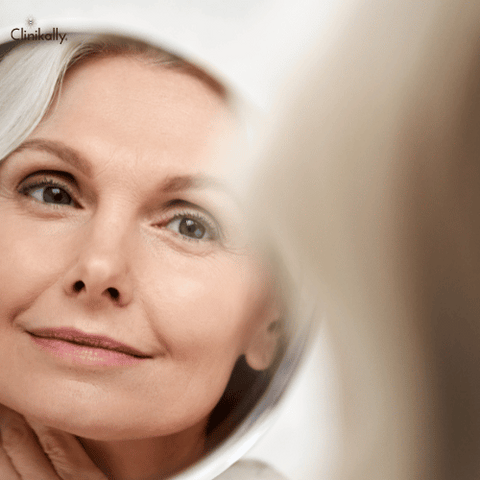
Skin ageing is a normal part of the ageing process. It is distinguished by skin changes such as loss of suppleness, skin thinning, and the creation of wrinkles and fine lines. These changes occur as a result of a variety of variables, including genetic predisposition, environmental factors like sun exposure and pollution, and lifestyle factors like smoking and a poor diet. As we get older, our skin generates less collagen and elastin, two proteins that give our skin structure and elasticity, resulting in wrinkles and drooping skin. Furthermore, the skin's ability to retain moisture diminishes, resulting in dryness and the production of age spots.
What Causes Skin Aging?
Skin ageing is a normal process that occurs as we age. Both innate and exogenous factors influence it. Genetics, cellular metabolism, and hormonal changes are examples of intrinsic influences. Extrinsic influences include sun exposure, pollution, and lifestyle problems such as smoking, poor nutrition, and stress. Extrinsic and intrinsic factors can both contribute to the breakdown of collagen and elastin fibres in the skin, resulting in fine lines, wrinkles, and sagging skin.
Types of Skin Aging
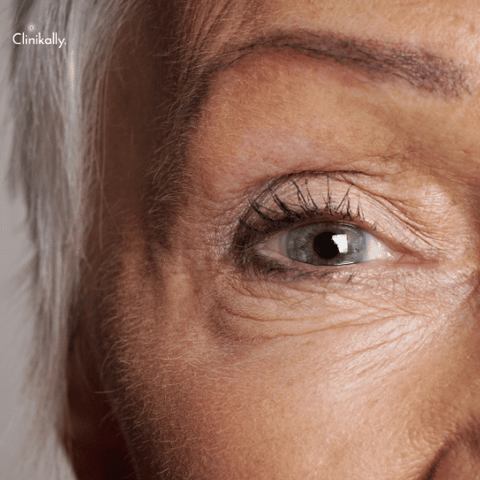
There are two types of skin ageing: intrinsic ageing and extrinsic ageing.
Intrinsic ageing, also known as natural ageing, is caused by the passage of time. It is caused by the skin's slow breakdown of collagen and elastin, which results in thinner, less elastic skin. Extrinsic ageing, on the other hand, is induced by environmental factors such as sunlight exposure, pollution, and lifestyle choices such as smoking and poor eating. Protective measures and healthy lifestyle practices can help to avoid or delay this form of ageing
Preventing Skin Aging
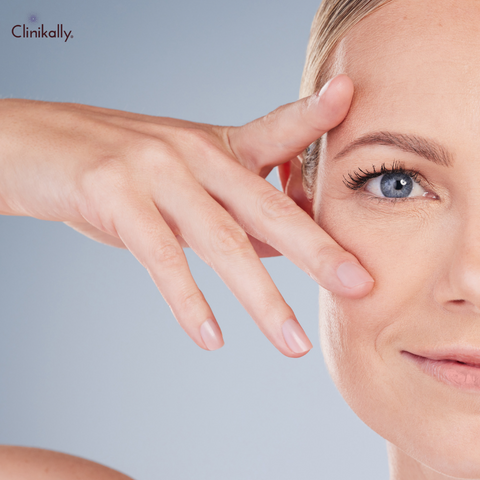
There are several steps you can take to prevent premature ageing and keep your skin looking healthy and young. Skin ageing is a natural process that cannot be completely avoided.
-
Sun protection: UV rays from the sun are one of the leading causes of premature skin ageing. Even on cloudy days, be sure to apply a broad-spectrum sunscreen with an SPF of at least 30. Wear protective clothing, such as long sleeves and wide-brimmed hats, and try to stay out of the sun as much as possible during the hottest times of the day.
-
Keep hydrated: Water consumption is crucial for maintaining healthy, hydrated skin. Aim to consume eight glasses of water or more each day, as well as foods high in water like cucumbers and watermelon.
-
Eat healthily: Antioxidants, vitamins, and minerals are abundant in a balanced diet, which can help to protect your skin from harm and delay the ageing process. Eat a lot of fresh produce, whole grains, lean proteins, and fruits and vegetables.
-
Get enough sleep: Sleep deprivation can cause wrinkles and fine lines, so aim for seven to eight hours of sleep per night. Sleeping on your back can also aid in the prevention of wrinkles and creases on your face.
-
Avoid smoking and excessive alcohol consumption: Both smoking and excessive alcohol consumption can hasten the ageing process and cause wrinkles, dry skin, and other skin issues. Quitting smoking and drinking in moderation can help you maintain healthy skin.
-
Use anti-aging skincare products: There are numerous skincare products on the market that can help reduce the appearance of fine lines and wrinkles, improve skin texture and tone, and protect your skin from further damage. Look for products containing ingredients like retinol, vitamin C, and hyaluronic acid.
You can assist to avoid premature skin ageing and keep your skin looking healthy and youthful by following these suggestions.
Healthy Lifestyle Changes
In order to maintain both good physical and mental health, one must adopt a healthy lifestyle. Here are some changes you can make to lead a healthy lifestyle:
-
Regular exercise can lower your risk of developing chronic diseases like diabetes and heart disease and can also help you maintain a healthy weight. Aim for 150 minutes or more per week of moderate-intensity exercise.
-
Maintain a healthy weight and lower your risk of chronic diseases by eating a balanced diet that is high in fruits, vegetables, whole grains, and lean proteins. Reduce the number of processed foods, sweetened beverages, and saturated and trans fats you consume.
-
Getting insufficient sleep has been linked to a number of health issues, such as depression, diabetes, and obesity. Try to get between seven and nine hours each night.
-
Chronic stress can cause a variety of health issues, including anxiety and depression. Find healthy stress-management techniques such as meditation, yoga, or deep breathing exercises.
-
Avoid using tobacco products and drinking excessive amounts of alcohol. These behaviours can raise your risk of developing a variety of illnesses, such as liver disease, heart disease, and cancer. Give up smoking and only occasionally, if ever, consume alcohol.
-
Maintain good physical and mental health by staying hydrated. Make an effort to drink eight to ten glasses of water per day.
-
Wash your hands frequently and practise good hygiene to help prevent the spread of germs and lower your risk of illness.
You can improve your overall health and lower your risk of chronic diseases by making these healthy lifestyle changes.
Diet and Nutrition
Diet and nutrition are critical for overall health and the prevention of chronic diseases. Here are some tips for a healthy diet and good nutrition:
-
Consume a variety of foods: Eating a variety of foods from all food groups (fruits, vegetables, whole grains, lean proteins, and healthy fats) can help you get all of the nutrients your body requires.
-
Limit processed foods: Processed foods are often high in added sugars, unhealthy fats, and salt. Reduce your intake of processed foods and replace them with whole foods.
-
Select healthy fats: Healthy fats can help reduce inflammation and lower your risk of developing chronic diseases. Some examples of these foods include nuts, seeds, avocado, fatty fish, and avocado oil.
-
Limit added sugars: Added sugars can contribute to obesity, type 2 diabetes, and heart disease. Reduce your consumption of sugary drinks, candy, and desserts.
-
Eat more plant-based foods: Fruits, vegetables, legumes, and whole grains are high in fibre, vitamins, and minerals. Eating more plant-based foods may help reduce your risk of developing chronic diseases.
-
Stay hydrated: Drinking plenty of water and other fluids can help you maintain good health and avoid dehydration.
-
Watch your portion sizes: Eating too much can lead to weight gain and other health issues. Pay attention to portion sizes and eat until you are satisfied rather than stuffed.
-
Consult a registered dietitian: If you have specific dietary requirements or health concerns, a registered dietitian can assist you in developing a customised nutrition plan.
You can improve your overall health and lower your risk of chronic diseases by following these tips for a healthy diet and good nutrition.
Effective Skincare Habits
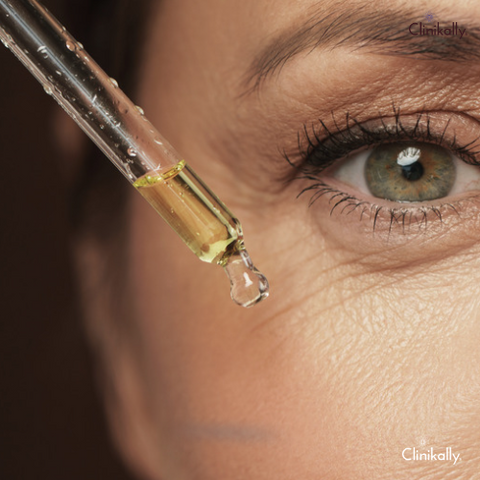
Developing good skincare habits can help you improve the appearance and health of your skin. Here are some pointers to help you develop a good skincare routine:
-
Cleanse your skin twice a day: To remove debris, oil, and makeup from your skin, use a mild cleanser. Cleansing aids in the prevention of clogged pores, which can contribute to outbreaks.
-
Apply sunscreen on a daily basis: To protect your skin from harmful UV rays, use a broad-spectrum sunscreen with at least SPF 30. Sun damage can cause premature ageing and increase your chances of developing skin cancer.
-
Moisturise regularly: Use a moisturiser to keep your skin hydrated and healthy. Choose a moisturiser that is suitable for your skin type.
-
Exfoliate once or twice a week: Exfoliating can help improve the texture and appearance of your skin by removing dead skin cells. Utilise a mild exfoliant, and steer clear of over-exfoliating, which can harm your skin.
-
Keep hydrated: To hydrate your skin from the inside out, drink a lot of water.
-
Get enough sleep: Sleep deprivation can result in dull, swollen skin. Aim for 7-8 hours of sleep each night.
-
Eat a healthy diet: Fruits, vegetables, and whole grains are all great for nourishing and maintaining the health of your skin.
-
Avoid smoking and binge drinking: Both excessive drinking and smoking can cause skin damage and premature ageing.
You can keep your skin looking and feeling its best by adhering to these sensible skincare practices.
Anti-Aging Products and Treatments
Anti-aging creams and treatments are available to help reduce the appearance of wrinkles, fine lines, and other signs of ageing. Here are some of the most well-liked options:
-
Retinoids: Retinoids, including retinol, are vitamin A derivatives that have been shown to smooth out wrinkles and fine lines on the skin.
-
Antioxidants: Antioxidants, such as vitamins C, E, and green tea extract, can aid in preventing free radical damage to the skin and enhance its general appearance.
-
Hyaluronic Acid: The body produces hyaluronic acid naturally, which keeps the skin hydrated and supple. Using products that contain hyaluronic acid can help improve the appearance of fine lines and wrinkles.
-
Chemical peels: A chemical solution is used to exfoliate the skin's outer layer during a chemical peel, which can help minimise the appearance of fine lines, wrinkles, and age spots.
-
Microdermabrasion: Microdermabrasion is a non-invasive procedure in which the outermost layer of skin is removed using a device. This procedure can help improve skin texture and lessen the visibility of fine lines and wrinkles.
-
Laser procedures: Laser procedures can aid in promoting the production of collagen and lessen the visibility of fine lines and wrinkles.
-
Botox: Botox injections temporarily paralyse the muscles that cause wrinkles and fine lines, which helps to reduce their appearance.
Before trying any anti-aging products or treatments, it's important to speak with a dermatologist or skincare expert. They can advise you on the best options based on your skin type and concerns.
Retinoids and Topical Treatments
Retinoids are a type of vitamin A-derived chemical that is used in topical therapies for a number of skin problems. The following are some facts concerning retinoids and topical treatments:
-
How retinoids work: Retinoids diminish the appearance of fine lines, wrinkles, and age spots by accelerating cell turnover. They can also help to unclog pores and reduce the development of acne.
-
Types of retinoids: Retinoids come in a variety of strengths, including prescription-strength retinoids like tretinoin, adapalene, and tazarotene, as well as over-the-counter retinol.
-
Retinoids with a prescription strength: Prescription-strength retinoids are more potent than over-the-counter retinoids and may cause more discomfort. They are commonly used to treat severe acne as well as fine lines and wrinkles.
-
Over-the-counter retinol: Over-the-counter retinol creams are gentler than prescription-strength retinoids, but they can still help reduce the appearance of fine lines, wrinkles, and age spots.
-
How to use retinoids: Retinoids should be used at night since sunshine degrades them and makes them less effective. They might irritate the skin, so start with a low concentration and gradually increase over time. It's also vital to wear sunscreen during the day because retinoids can make you more sensitive to the sun.
-
Other topical treatments: Other topical therapies for other skin issues are available, such as benzoyl peroxide for acne, hydroquinone for hyperpigmentation, and alpha-hydroxy acids for exfoliation. To discover the best treatment for your specific symptoms, consult with a dermatologist or skincare professional.
Retinoids and other topical therapies can help to improve the appearance of a variety of skin problems. To avoid discomfort or other side effects, it is critical to use them appropriately and under the supervision of a healthcare practitioner.
Antioxidants and Other Ingredients
Antioxidants are a type of chemical that protects the skin from free radical damage and oxidative stress, both of which can contribute to ageing and other skin problems. Other compounds typically found in skin care products and their benefits are as follows:
-
Vitamin C: Vitamin C is a powerful antioxidant that helps brighten the complexion, even out skin tone, and minimise the appearance of fine lines and wrinkles. It also aids in the formation of collagen.
-
Vitamin E: Vitamin E is a potent antioxidant that fights inflammation and free radical damage to the skin. It can also help to moisturise and improve the texture of the skin.
-
Green tea extract: Green tea extract is a strong antioxidant that has the potential to lessen inflammation and shield the skin from UV ray damage. It can help to improve skin texture and has anti-aging properties.
-
Niacinamide: Niacinamide is a type of vitamin B3 that can help to reduce inflammation, improve skin barrier function, and reduce the appearance of fine lines and wrinkles. It also regulates sebum production and can be beneficial for acne-prone skin.
-
Glycolic acid: Glycolic acid is an alpha-hydroxy acid (AHA) that can help exfoliate the skin, improve skin texture, and reduce the appearance of fine lines and wrinkles. It can also help with acne-prone skin.
-
Hyaluronic acid: A natural humectant, hyaluronic acid can help to hydrate and plump the skin. It can also aid in the reduction of fine lines and wrinkles.
-
Ceramides: Ceramides are lipids that aid in the strengthening of the skin barrier and the prevention of moisture loss. They can benefit dry or sensitive skin.
Including antioxidants and other helpful components in your skincare routine can help to improve your skin's general health and appearance. For the best results, use products that are appropriate for your skin type and issues and use them consistently.
In-Office Procedures
In-office procedures are treatments conducted in a clinical setting by a dermatologist or other skincare professional. Here are some examples of common in-office procedures and their associated benefits:
-
A type of exfoliating procedure, chemical peels can help to improve skin texture, lessen the visibility of fine lines and wrinkles, and lessen hyperpigmentation. They work by removing the dead skin cells on the surface of the skin and stimulating collagen production.
-
Microdermabrasion is a non-invasive exfoliating treatment that removes the outer layer of dead skin cells with a device. It can aid in the improvement of skin texture, the reduction of fine lines and wrinkles, and the reduction of hyperpigmentation.
-
Laser resurfacing is a procedure that uses a laser to remove the outer layer of skin and stimulate collagen production. It can help to improve skin texture, reduce hyperpigmentation, and reduce the appearance of fine lines and wrinkles.
-
These injectable treatments can help to smooth out the texture of the skin, add volume to the face, and lessen the appearance of fine lines and wrinkles. Botox relaxes the muscles that cause wrinkles, whereas dermal fillers add volume to the skin.
-
Microneedling is a procedure in which tiny punctures in the skin are created using a device with small needles. This stimulates collagen production and can aid in the improvement of skin texture, the reduction of fine lines and wrinkles, and the reduction of hyperpigmentation.
-
IPL therapy targets areas of hyperpigmentation and redness with a device that emits light pulses. It can aid in the improvement of skin tone as well as the reduction of the appearance of age spots and sun damage.
In-office procedures can be beneficial in treating a variety of skin issues and producing a more youthful, radiant appearance. However, it is critical to consult with a dermatologist or skincare professional to decide the best treatment for your unique issues and skin type.
Conclusion
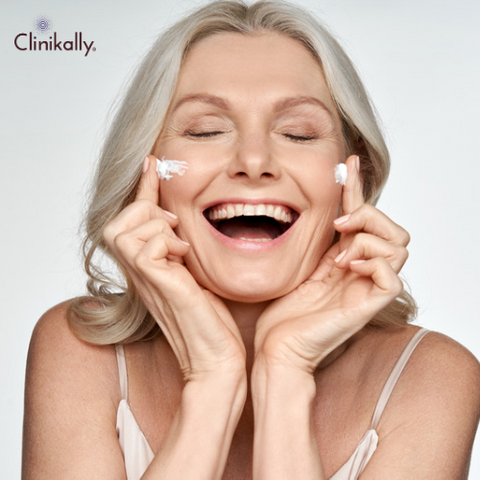
Skin maintenance is essential for preserving a healthy and youthful appearance. It is critical to have a regular skincare routine that includes washing, moisturising, and sun protection. Furthermore, beneficial substances such as retinoids and antioxidants can assist in improving the overall health and appearance of the skin. In-office procedures can also be useful in treating a variety of skin issues, but it's vital to speak with a dermatologist or skincare professional to decide the best treatment for your individual concerns and skin type. You can obtain a healthy, radiant complexion that looks and feels its best by taking care of your skin both at home and with professional treatments.
















